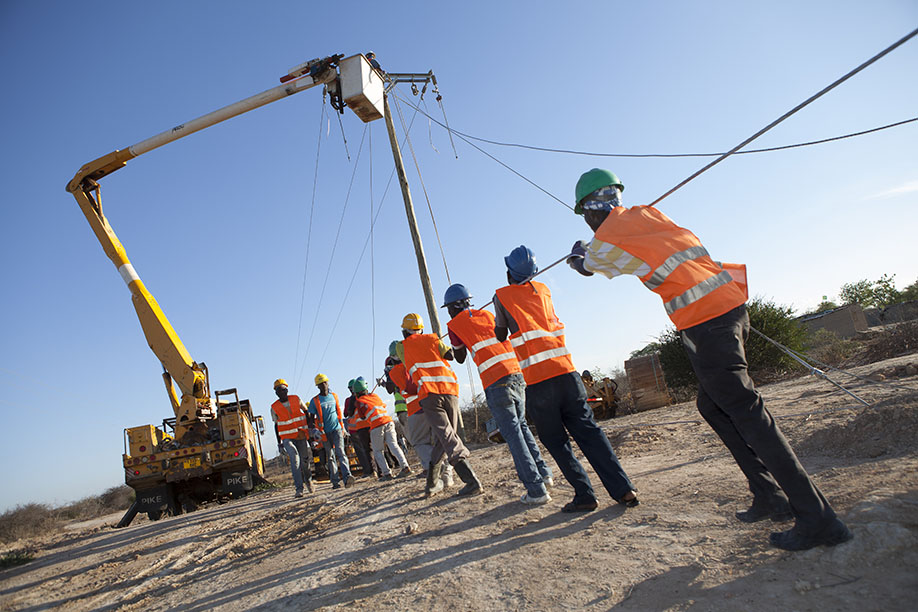
Jake Lyell for the Millennium Challenge Corporation
A utility crew works to string power lines in rural Dodoma Region, Tanzania. The initiative was part of the Millennium Challenge Corporation's power sector project.
Last week I had the opportunity to welcome more than a hundred practitioners and thought leaders to the “Energy for Development Conference: Promoting a Gender-Inclusive and Pro-Poor Sector.” Co-sponsored by MCC, Power Africa, and the World Bank’s Energy Sector Management Assistance Program, the conference was a chance to grapple with the practical challenges involved in expanding access to electricity in ways that are at once sustainable, growth-promoting and inclusive.
This is no small task. Today, 1.4 billion people—including two-thirds of the population of sub-Saharan Africa—lack access to electricity. And that has an impact on nearly every aspect of their lives. It affects their income prospects, education, health, connectivity with others, and access to information, markets, and goods and services, such as financial services.
At last week’s signing ceremony for the new MCC compact with Benin, Vice President Joe Biden put it well. Quite simply, “power empowers.” Consider the impact that electrifying rural areas had in South Africa, where female employment jumped 9 percent. Worldwide, electricity has helped free up time for women and girls that was previously spent collecting fuel, fetching water and cooking.
Access to electricity has been shown to benefit education outcomes for girls and boys. Many studies show unexpectedly high gains in years of schooling completed associated with access to electricity. Electricity helps expand the time students can devote to homework at night, and helps families feel more secure sending their girls to walk to school in the early hours of the morning.
The stakes are high, but the solutions are not simple. How do we reach the poor while ensuring high economic returns from our investments? Are we measuring the full range of benefits accurately, particularly for the poor? How do we help reduce the costs of connections and wiring houses? How can we use pay-for-outcomes tools to incentivize better consumer and business service and hold utilities accountable? What are the best technologies and business models for off-grid systems serving remote communities? What kind of targeted subsidies for the poor are efficient and supportive of their long-term income growth? What kinds of green finance tools can help give the poor, and micro and small businesses, access to green energy?
As a growing share of MCC funds are channeled into the power sector, the need for solving these complex issues has become increasingly urgent. MCC has already committed $850 million and expects to invest another $1 billion to support the U.S. Government’s Power Africa effort to double electricity access in sub-Saharan Africa. Our forthcoming pipeline includes potential energy investments in Liberia, Tanzania, Sierra Leone, as well as Nepal. And just last week our CEO Dana J. Hyde was joined by Vice President Joe Biden and Dr. Thomas Boni Yayi, the President of Benin, for the signing of a compact that includes the U.S. government’s single largest investment in off-grid electrification.
All of these compacts present an exciting opportunity for MCC and its partner countries to innovate for inclusive outcomes. In Ghana, Liberia, Benin, Tanzania, and Sierra Leone, planned or proposed projects include activities to improve the way utilities understand and serve the needs of their customers, increase connections for female-headed households (which are likely to have less access), minimize safety risks to communities, improve job opportunities for women as energy users and producers, and use new customer online platforms to help expose and thereby reduce attempts to extort bribes from the poor for connections.
Energy investments of the scale we are contemplating require a concerted, multifaceted approach. They have to combine support for infrastructure investments with policy reforms, institutional strengthening, education, green finance tools, strong customer feedback mechanisms, and a very robust understanding of the needs and constraints of the poor, including women and girls who don’t often get specific attention in power investments.
As the international development community tackles these issues, we are determined to work with a growing array of partners to ensure that the poor and women share in the transformational benefits of large-scale energy investments.

